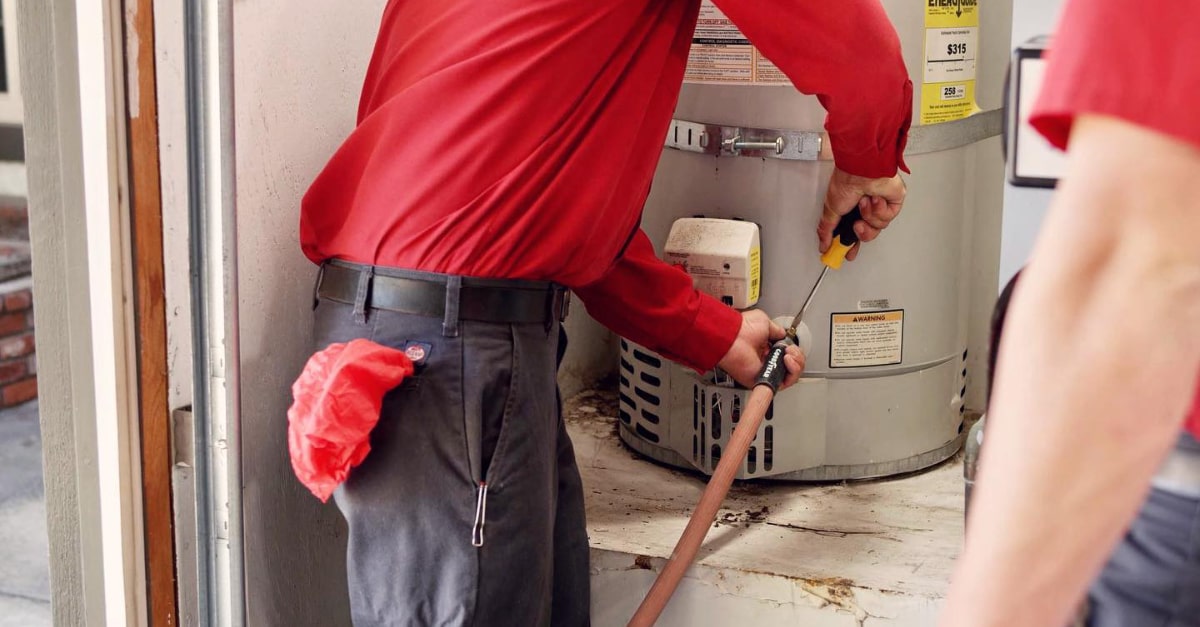Water Heater Repair vs. Replacement
Cool, crisp water may be great to cool down on a hot day, but it’s not ok for your morning shower. Many parts of your home use hot water — your faucet, washing machine, and dishwasher, to name a few — and that warm water comes to you through your water heater.
Your water, whether it’s municipal or well water, races through the pipes at a cooler temperature, and if you want a warm shower, your water heater can be your best friend.
Water heaters are large, cylindrical metal containers found in laundry rooms, utility closets, and garages. They are easily forgotten appliances. But if you’re showering with inconsistent temperatures due to a failure in your water heater, it will no longer be a forgotten relic.
How Does It Work?
Although important to your home, modern water heaters are surprisingly simple. The two main parts are the drum that holds the water and a heating device. An internal thermostat controls the temperature to a range appropriate for your home, and a tube feeds cold water from your water system into the bottom of the tank. As the water warms up, the hot water at the bottom rises and is distributed to your faucets and appliances. Wish to learn more? Give your Orange County, California plumbers a call today, we'd be happy to help answer any water heater questions you may have!
Common Problems with Water Heaters
Most water heaters have a lifespan of 8–15 years, give or take a few years, and have been known to run for years without a problem. Here are a few of the most common household water heater issues that can lead to water heater repair or water heater replacement:
- Inconsistent water temperature
- Difficulty maintaining a high temperature
- Lack of hot water
- Unusual noises, including hissing or whining
- Rusty or cloudy, hot water
- Leaks from the top or bottom
If you experience any of these warning signs — or in the worst-case scenario, more than one of these warning signs — it’s time to call in the professionals from our Tom Moffett Plumbing team.
As with any major appliance, problems with your water heater don’t necessarily mean you’ll need to replace it right away. There are times when a repair will keep your water heater working well for a few more years. Our team has extensive experience with water heaters and can tell you either way upon a quick review, but the following are a few tips to help you determine whether a repair or replacement is in your future.
A water heater repair is a more cost-friendly option, especially if your water heater is five years old or less. A repair can help your home get back to normal quickly. Some of the most common repairs include:
Flushing and Cleaning Your Water Tank
Many times, foul-smelling hot water and hissing, crackling, and popping noises can be fixed by draining your hot water tank, cleaning the tank and the heating element, and replacing the water. You should seek help from our professional plumbing team.
Replacing Heating Elements or a Thermostat
If your water heater isn’t making hot water, it is likely a problem with the heating element in an electric water heater and a thermocouple in a gas heater. A faulty thermostat or frayed wiring could also be the culprit, but these are all easily repaired.
Valve Replacement or Pipe Tightening
A leak from the top of your water heater usually identifies a failing valve or loose pipe. This repair category is also straightforward and won’t directly lead to your water heater needing replacement.
Sometimes, you will need to replace your water heater altogether. There are a few key indicators that your water heater needs to be replaced.
Water Heater Age
Age is one of the most important factors in the decision to replace your water heater. A water heater that has any of the warning signs above and is also more than 15 years old should be replaced, as a repair could be a quick fix that ends up costing you more money over time.
Water Heater Leaking
Another major red flag is leaking from the bottom of your water heater. Although excess water can sometimes be from condensation, it could be a result of a leak in the tank, which can’t be repaired. You’ll need to replace your water heater in this case.
Corrosion
One part of your water heater, the sacrificial anode rod, is the first line of defense between your water heater and destructive corrosion. Rusty water means this critical piece has likely failed, and the tank will continue to rust and weaken. Replacement is highly recommended to avoid major damage from a broken-down tank!
Whether your water heater has a few more years or is on its last legs, the Tom Moffett Plumbing team can get your hot water flowing again. Call for a flat, upfront estimate today.
